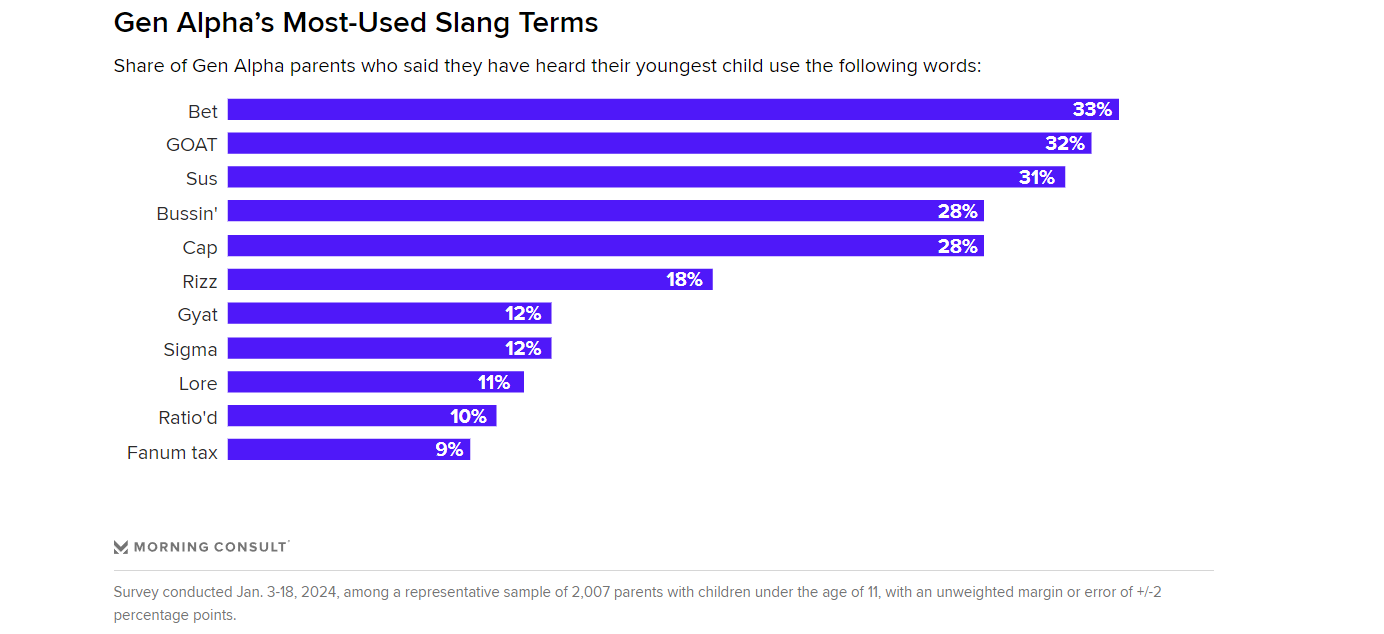By the Numbers: The slang Gen Alpha uses, no cap
Get to know the language of this up-and-coming generation so you can use it (or not) wisely.

I promise that headline was the last ironic use of Gen Alpha slang you’ll hear from this elder Millennial.
But Generation Alpha, those born between 2010 and today, are rising. And they speak in their own unique way that PR professionals should understand — if only so they can avoid using it in a “how do you do, fellow kids?” sort of way.
New data from Morning Consult delves into the unique terminology this cohort uses, and we’ll break it all down. But first, let’s talk about Gen Alpha, and why you should already be paying attention to this generation of children.
About Gen Alpha
Gen Alpha is profoundly shaped by technology. The same could be true of both their Gen Z and Millennial ancestors, but Generation Alpha has a particular affinity for smartphones and tablets. They’ve never known a world without these touch-based devices.
Many are dubbed “iPad kids,” often derisively, for their parents’ habit of simply handing them devices to entertain them in social situations — and their frequently negative reactions when the stimulus is taken away. Their young lives were also profoundly shaped by the coronavirus, which caused many of them to spend their formative years in varying levels of lockdown and isolation.
Their economic impact is beginning already and is only expected to grow: by 2029, they’ll account for $5.46 trillion in spending. They’re also an extremely brand-savvy generation, and not necessarily the brands you might expect. As social media sites like TikTok and Instagram give kids more direct contact with adults, they start gravitating toward the same kinds of products that their elders enjoy. These are more likely to be Sephora and Ulta skincare aficionados rather than Toys R Us kids.
But it isn’t all about glowy complexions. Gen Alphas are also big gamers, and that love extends beyond the games themselves and into following their favorite streamers and chatting about their favorites. And they’re more likely to play on a cellphone than a fancy console.
Now that we’ve gotten to know Gen Alpha more, let’s dive into how they talk.
New generation, new slang
Every generation develops its own unique vernacular that they love and that profoundly irritates and befuddles the adults in their lives.
Gen Alpha is certainly no exception.
Morning Consult’s survey found that 29% of the parents of Gen Alpha (who are mostly Millennials, with a few Gen Zers thrown in for good measure) have heard their children use language they did not understand. This percentage increases as the child grows older, with 43% of parents of 8-10-year-olds scratching their heads over the words coming out of their children’s mouth. Children who socialize online are also far more likely to use confounding phrases than those who don’t (47% vs 23%).
And what are some of these neologisms the youths love so much?

You may have heard some of these. Heck, you may have used some of these. There aren’t bright generational lines around these terms; for instance, GOAT (Greatest of All Time, used to describe someone or something that’s very good) has been used in sports for years.
But let’s take a quick look at what these terms actually mean.
Bet: A term of agreement or being game for something: “Bet, let’s go!” Depending on tone, however, it can also be used to express doubt, according to Dictionary.com.
GOAT: As previously mentioned, this means the Greatest of All Time. It’s pronounced just like the animal and the adjective “goated” can also be used as a descriptor, USA Today reported. You might also see the goat emoji, which indicates the same thing.
Sus: Short for “suspect” or “suspicious” and conveying the same idea. While the slang term grew in popularity due to its use in pandemic-era game Among Us, it’s been around for nearly 100 years, Merriam-Webster said.
Bussin’: Something very good. Originates from African American Vernacular English (AAVE) on TikTok, according to Today.com.
Cap: Another AAVE term, cap means bragging or lying. No cap, however, means something is true or real.
Rizz: Dubbed the Oxford English Dictionary’s word of the year 2023, rizz means charm or attractiveness, particularly in a romantic sense. It possibly derives from the word “charisma.”
Gyat: Business Insider explains this is a compliment for a girl with a nice behind.
Sigma: Usually used in the phrase “sigma male,” it means an independent man or a lone wolf, according to Dictionary.com.
Lore: In this context, lore means the story behind something. It’s often used to describe the worldbuilding of TV shows and video games, according to very reputable source Urban Dictionary.
Ratio’d: Someone is ratio’d when the ratio of the replies on a piece of social media content is much bigger than the likes or shares on that post. Typically, it means someone did something dumb and is getting dragged for it.
Fanum tax: Named after streamer Fanum, this refers to stealing part of someone’s food.
If you choose to use these words, make smart decisions.
Allison Carter is editor-in-chief of PR Daily. Follow her on Twitter or LinkedIn.








These are solidly Gen Z slang words. If Gen Alpha is using them it is because their older siblings are!
Some of the words are circling back to the earlier standard meanings. There are many these days who don’t know something exists if it happened more than fifteen minutes ago.
“If you choose to use these words, make smart decisions.”
If you choose to use these words, haven’t you already failed to make smart decisions?
TX0008401638 / 2017-06-01
.
Born 2000-2020, The Children of the Gray Area, where Media is the Mentor…… The end of the Computer Age is 2000, the start of the Communications Age is 2000, where the hardware software infrastructure had already been written, and the U S. citizens then could freely talk without electronic limits. Parents are no longer the censors, and only Media then directs conversation of the younger generation (The Children of the Gray Area).
.
Jay Willis, Atlanta, GA.
.
.
Please read this as copyrighted at the U.S. Copyright Office, for generational studies. It fits better with your subject than Gen-Alpha.
Not really Gen Alpha slang, more like Gen Z. And Cap, Bet and like the article stated: bussin, are all African American slang.
I think part of the reason for Gen Alpha picking up this slang is because Gen Z made alot of slang they never said in real life, only stuff they would write in comments or on Twitter, mostly slang like Sigma or Fanum Tax. And because Gen Alpha is so young and in their developmental phases they kind of picked it up, but they actually said it aloud unlike Gen Z. Also I feel like another part of this is that Gen Z used alot of that slang ironically, but Gen Alpha didn’t register that because they were on the younger side, so that’s how they picked it up. For example like Sigma.
I think these are all Mostly Gen Z slang, but you could make a solid argument that Gen Alpha has a slightly different definition then Gen Z.
Fookid
My favorite slang term is “I got the drip.” Apparently used in place of “My jacket is fire.”
Also wondering just how many kids today know what the “drip”
Stupid phone. I meant to include how many know what the “drip” actually means.
I thought no cap originated w online gaming thiugh
My brother in Christ if you finna use the slang use it on point not boomer AF hella cringe
Half of these are Gen Z terms, they’re just copying us. And I’m certain GOAT is a millennial one.
you even jonklr bro? amidum?
Yeah, these are definitely gen z words. I have two gen z kids and they use these all the time. But on the bright side I can use this article to tease them that they are talking like gen alpha kids.
…”bet, bussin” has been around AAVE/Ebonics/Jive since the 70s…
This article is not only cringe af but factually incorrect too. 90% of these words are from hip hop vernacular that have finally made it to the mainstream…and also aren’t most gen alphas sired by Gen X?
Anyway this is further evidence of how powerful the hold hip hop has on youth culture. And if we look at the state of hip hop now, we should be wary of this influence…and I Iove hip hop. Just keeping it buck…
With the exception of maybe that, none of th sé are Gen Alpha slang, in fact realistically there really isn’t much Gen Alpha slang due to the fact that they’re all 14 and under, with the majority being preteens. We aren’t gonna really see Gen Alpha slang as a major thing until around 2028-2030.
“Gyat: Business Insider explains this is a compliment for a girl with a nice behind”
this took me out lmao
Lmao no, Gen X tend to be the sires of gen Z (1997-ish-2009) while millennials are typically the parents of Gen Alpha (2010-202X)
As Gen A/Gen Z, this pains me. Terribly.
pfft. i invented tax as stealing food from my Gen z and Gen alpha kids. when they were little and asked me to open a package or Gatorade I would always take some and tell them that’s the tax. when they asked me what tax is I said, That’s the price you pay when you ask somebody else to do something for you like the government.
Fanum owes me rights.
Half of the words out of my 8 year old’s mouth are some variation of “bruh”. It is genderless…used with women as well as men. how is this not #1 on the list? “IDK” used in actual conversation. That goes for lots of other online acronyms. they’re in everyday verbal conversation. “Ohio” also comes to mind…to mean a very derpy way of doing something. They also don’t use “cool” nearly as much as we do.
Pains me to say it, but Gen Alpha would be the grandkids, not kids of Gen X.
S#&t… back in my day, if you had “the drip” you weren’t looking for a complement, you looking for a clinic!!
And for the record, GenX’rs are NOT boomers,
I am a gen x with an alpha daughter.
There are some gen x parents peppered in with gen alpha kids… our kids call us old but love our music:)
Bussin’ is 80’s slang come back around. I would credit it to 80’s rap i.e. Beastie Boys. I love that Alpha’s are bringing back Gen X influence.
me too. my fourth I had at 36, but high isn’t that old for having kids. I have a friend my age who had her fourth at 41, so I agree. But I’m a young Gen C, born in 75.
According to Oxford languages, the word “Lore” has been in use since the 1800’s, at least. It may be more popular since the rise of video games, but it is not slang.
Agree with everyone’s observations that these are more ages Z terms and not Gen Alpha
(I’m a millennial and we definitely use some of these like GOAT.) But I also find it strange that you point out the AAVE origins of many of the slang terms while simultaneously (and seemingly unironically) use the word “dragged” without explaining that term’s origin and that it’s a reference to lynching. Cringe.
“Lore” and “Ratio’d” have had these meaning since before those kids were born. I’m a GenX old fart, and I know them.
Gyat is short for god damn
I am Gen X with no kids and even I knew all of them but ‘Fanum tax”
None of these words are Gen Alpha.
BET has been around since at least the 80s-90s and was less used by the millennials and has probably made a resurgence due to YouTube and the availability of older films and music.
Sus has been around since at least the 90s, that I can remember.
GOAT was helped to be made popular by 100m sprint gold medalist Maurice Green in the late 90s/early 2000s. He was the big dog of track and field before Asafa Powell and then Usain Bolt showed up.
Bussin is an old black American thing going back at least 40/50 years.
Cap is a late Gen X/millennial expression that was popularised by Future and Young Thug, both of whom are millennials. Some say it even derives from the early 20th century term “to cap” which, in AAVE, meant to exaggerate. No cap would then mean “no exaggeration”.
.
Rizz is a late millennial/Gen Z expression.
Gyat, being AAVE for God when said in the context of goddamn, has been around since at least the seventies.
Sigma is a late Gen X/Millennial term which was already in use in the mid to late 2000s online.
Lore is a term that existed even in the time of Tolkien. People often referred to his legendarium as Lore. This concept, of course, existed before and was then extended to video games and epic series such as Game of Thrones. This term is not to do with Gen Alpha at all.
Ratio’d is later Millennial/Gen Z slang, and the concept it represents goes back to Gen X.
Fanum is a Gen Z and the idea of taxing someone by taking their food is as old as humanity, as it was literally the first form of taxation.
Gen Alpha are too young to influence slang, especially when all they are able to do is copy the slang that is already dominant and that comes from their elders, the same way they copied their overall language.
here just to remind u that Gen Alpha starts in 2013, and most of their slang is Gen Z slang.
in all fairness, the articles’ title is not “the slang gen alpha came up with” but rather “the slang that generation alpha USES” The author hasent specifically claimed that they came up with any of it. Even if they are just parroting from generation Z, Millennials, gen x, jive, hip hop or the dark ages it is still the slang they are using.
Like people only have kids in their 20s! Plenty gen X with gen Alpha offspring also. Our 7 year old daughter speaks Mr Beast/shouting man-child pretty fluently 😆
ALL of slang from Silent generation to gen Alpha is recycled words used in abbreviated form by the next generation. Nothing is new under the sun today!…PERIOD!!!!
except for fanum tax they got all these words from gen z tbh
I’ve got 3 grandkids..11, 13 and 14.
I just sit back and enjoy their language melee.. not always sure what it means and I’m not gonna ask.
it’s just fun to witness lol! (there’s my acronym 😋)
“sigma” is not a gen-z or alpha term. it’s an incel term.
For everyone explaining when these terms originated and specifically who used them first:
I think what this article is pointing out is that where ever and when ever these terms originated, these ARE the slang terms Gen ALPHA is by and large using in spoken language in all of their conversations.
It’s not really a debate of where the terms first started or whom started them.
OP got ratio’d. 😭